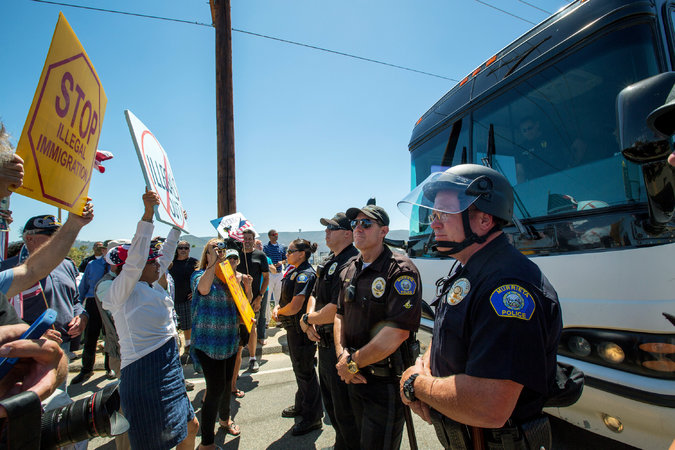Yesterday in our church choir we led the congregation in singing “The Battle Hymn of the Republic,” it being the July Fourth weekend. Encountering the Biblical allusion to “the grapes of wrath” was timely as I had been thinking of Steinbeck’s novel after seeing a California community lash out against the wave of immigrants we are seeing. Here’s from the account in the New York Times:
When the three busloads of immigrant mothers and children rolled into town for processing at a Border Patrol station this week, they were met by protesters carrying American flags and signs proclaiming “return to sender” as they screamed “go home” and chanted “U.S.A.” Fearing for the safety of the migrants and federal officers, immigration officials decided to reroute the buses to San Diego, an hour south.
And a day after many here celebrated what they saw as a temporary victory, more than a thousand residents packed a high school auditorium on Wednesday night for a town-hall-style meeting that lasted more than four hours, voicing fears about an influx of migrants.
“What happens when they come here with diseases and can overrun our schools? How much is this costing us?” one resident, Jodie Howard, asked the mayor.
And now here’s the description of California protesters as described in Grapes of Wrath. In Steinbeck’s case, the migrants are small farmers thrown out of work by the Dust Bowl and by the rise of technology. But whether driven by hunger or by fear of Central American violence, the migrants trigger a similar sequence of events. Here’s Steinbeck:
The great highways streamed with moving people. There in the Middle—and Southwest had lived a simple agrarian folk who had not changed with industry, who had not farmed with machines or known the power and danger of machines in private hands. They had not grown up in the paradoxes of industry. Their senses were still sharp to the ridiculousness of the industrial life.
And then suddenly the machines pushed them out and they swarmed on the highways. The movement changed them; the highways, the camps along the road, the fear of hunger and the hunger itself, changed them. The children without dinner changed them, the endless moving changed them. They were migrants. And the hostility changed them, welded them, united them—hostility that made the little towns group and arm as though to repel an invader, squads with pick handles, clerks and storekeepers with shotguns, guarding the world against their own people.
In the West there was panic when the migrants multiplied on the highways. Men of property were terrified for their property. Men who had never been hungry saw the eyes of the hungry. Men who had never wanted anything very much saw the flare of want in the eyes of the migrants. And the men of the towns and of the soft suburban country gathered to defend themselves; and they reassured themselves that they were good and the invaders bad, as a man must do before he fights. They said, These goddamned Okies are dirty and ignorant. They’re degenerate, sexual maniacs. Those goddamned Okies are thieves. They’ll steal anything. They’ve got no sense of property rights.
And the latter was true, for how can a man without property know the ache of ownership? And the defending people said, They bring disease, they’re filthy. We can’t have them in the schools. They’re strangers. How’d you like to have your sister go out with one of ’em?
The local people whipped themselves into a mold of cruelty. Then they formed units, squads, and armed them—armed them with clubs, with gas, with guns. We own the country. We can’t let these Okies get out of hand. And the men who were armed did not own the land, but they thought they did. And the clerks who drilled at night owned nothing, and the little storekeepers possessed only a drawerful of debts. But even a debt is something, even a job is something. The clerk thought, I get fifteen dollars a week. S’pose a goddamn Okie would work for twelve? And the little storekeeper thought, How could I compete with a debtless man?
And the migrants streamed in on the highways and their hunger was in their eyes, and their need was in their eyes. They had no argument, no system, nothing but their numbers and their needs.
The United States is now facing what other countries around the world have faced when their neighbors face human upheavals. Think of it as a test of everything that we, an immigrant nation, believe in.


